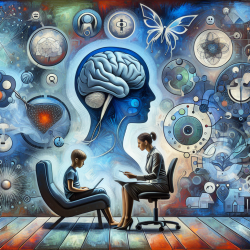In recent years, discoveries in neuroscience have greatly impacted therapeutic practices. Neuroscience-based psychotherapy offers new insights into how we can tailor interventions for specific groups of patients or therapy settings. The research article "Neuroscience-based psychotherapy: A position paper" by Cammisuli and Castelnuovo (2023) provides critical recommendations for mental health practitioners. Here, we discuss key findings from the paper and how they can be applied to improve psychotherapy practices.
1. Psychotherapy of Traumatic Memories
Neuroscience research highlights the role of brain-derived neurotrophic factor (BDNF) in long-term memory formation and synaptic plasticity. Patients with psychiatric disorders often show lower levels of BDNF, but psychotherapy can help increase these levels, especially in cases of PTSD, bulimia, insomnia, and borderline personality disorder.
- Moderate stress is necessary for memory storage.
- Memory reconsolidation supports the creation of alternative behaviors.
- Specific techniques, such as cognitive restructuring and imagery modification, are effective for PTSD.
2. Neurobiology of Attachment Therapy
Attachment theory provides a psychological grounding for psychotherapy, emphasizing the importance of early life experiences with caregivers. These experiences shape the development of brain areas involved in emotional regulation and interpersonal relationships.
- An attachment-based approach links infant experiences with caregiver responses.
- Neurochemical and hormonal changes in new parents should be considered in perinatal psychotherapy.
- Understanding subcortical emotional systems is crucial in couple therapy.
3. Cognitive Psychopathology and Psychotherapy
Cognitive deficits can significantly impact psychotherapy outcomes. Psychotherapists should assess cognitive functioning and use cognitive remediation techniques to enhance treatment effectiveness.
- Executive dysfunction can hinder therapeutic processes.
- The Default Mode Network (DMN) disruption is linked to anxiety, depression, PTSD, and schizophrenia.
- Cognitive remediation therapy should precede psychotherapy for severely ill patients.
4. The Therapeutic Process of Human Empathy
The mirror neuron system (MNS) and Theory of Mind (ToM) play crucial roles in empathy and therapeutic relationships. Psychotherapists should leverage these systems to enhance treatment outcomes.
- The MNS supports understanding and empathy in therapy.
- Group therapy can enhance emotional regulation and interpersonal skills.
- Face-to-face exposure to traumatic memories in PTSD can improve emotional regulation.
5. Neuroimaging and Psychotherapy
Neuroimaging techniques, such as fMRI and PET, can identify biomarkers and predictors of treatment outcomes. These insights can help tailor interventions and improve psychotherapy effectiveness.
- Neuroimaging can identify brain function biomarkers associated with psychotherapy.
- Top-down and bottom-up regulation techniques are necessary for treating anxiety and depression.
- Standardized protocols based on neuroimaging can enhance treatment response and cost-effectiveness.
6. Interpersonal Neurobiology for Somatic Symptoms
Interpersonal neurobiology (IPNB) integrates relationships, brain mechanisms, and mind processes. This approach can be particularly effective for treating somatic symptoms and related disorders.
- IPNB emphasizes the integration of body and mind for wellbeing.
- Vertical integration of brain structures can aid in treating somatic symptoms.
Neuroscience-based psychotherapy offers a promising path to enhance mental health interventions. By integrating these insights into clinical practice, psychotherapists can provide more effective and tailored treatments for their patients.
To read the original research paper, please follow this link: Neuroscience-based psychotherapy: A position paper.










